Person-Centered Approaches in Schools and Transition (PCAST)
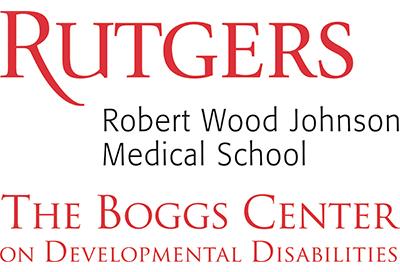
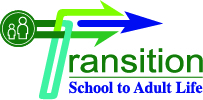
Welcome to the PCAST Project!
The New Jersey Department of Education, Office of Special Education, in partnership with The Boggs Center on Disability and Human Development at Rutgers, The State University of New Jersey, provides training, coaching and other professional learning opportunities to school staff, students, and family members to promote using person-centered approaches to ensure effective supports are available and used to achieve positive outcomes for students in elementary grades through high school and 18-to-21-year-old programs.
|
Project staff provide multiple and ongoing learning opportunities through a variety of collaborative activities and practices including direct demonstrations so that training participants can learn about, experience, and practice person-centered approaches in school and during the critical process of planning for effective supports for students. These efforts serve to build capacity within schools to positively impact outcomes for students. Project staff work closely with educators as they plan and innovate specific strategies to that end. Project activities encourage meaningful relationships between educators, students, and family members, and promote successful collaboration that leads to targeted supports and individualized plans centered on students. Project activities also help students learn self-determination and self-advocacy skills and increasingly participate in and lead planning meetings. |
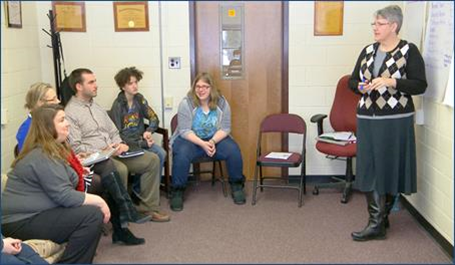 |
Person-centeredness begins with a fundamental belief that all people, no matter their distinctions or disability, come to us whole and complete. It is an understanding that all people have real strengths and gifts that are of value, and are needed by the communities they live in. We do not view people as broken and in need of fixing to be whole and to participate in their communities. Each person is born ready to belong and to be fully included in their homes, schools, and communities with the appropriate person-centered supports in place.
|
This differs from a “system-centered” model, which is fundamentally deficit-based and is frequently found in systems that provide paid services and supports to people. In this kind of deficit-based approach people are assessed and evaluated to identify deficiencies so that treatment plans can be developed based on that information. People tend to be placed into services together according to like deficiencies and labels. Furthermore, it is often a fixed menu of services that defines how those deficiencies are addressed. To be person-centered means that you actively strive to acquire a deep understanding of each person. Supports can then be designed specifically around them in whatever way works best and moves the student toward the community life they and their team envision. |
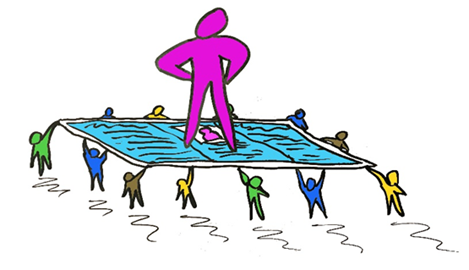 |
| Person-Centered Planning is a highly collaborative and respectful process that uses facilitated conversations and other methods to achieve a thorough understanding of each student. It involves various facilitated approaches for listening deeply to all participants in a comfortable, welcoming, and equitable environment. The person (student) who is the focus of the planning is central to the process and is present from start to finish. | 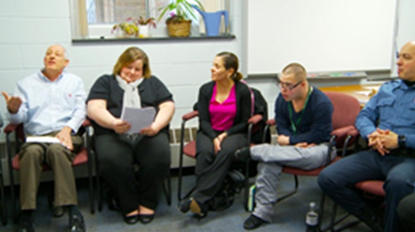 |
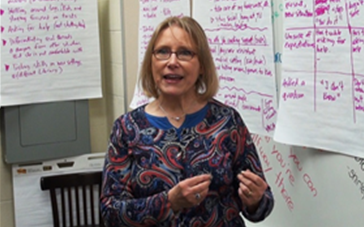 |
This process includes discovering gifts and passions, identifying what is most important to each student, establishing what supports work best for a given student, and expressing the shared vision that the student and their allies have for the future. Using that vision as a guide, supporters better understand how to build on existing strengths and overcoming specific barriers that might impede that vision. Person-centered approaches result in decisions, goals, and outcomes that are more targeted, relevant, and specific to the student. Person-Centered Thinking describes the everyday use of the skills and tools used in person-centered planning. The project is designed to support schools in applying the broad use of these skills by all educators in all settings. When used in this way, person-centered thinking serves to positively impact the culture and climate of classrooms, schools, and systems. |
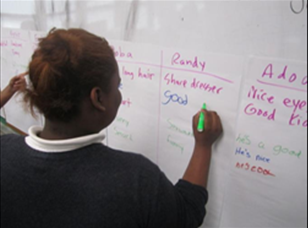 |
Person-centered approaches benefit all students and all people. They can be applied at any age or developmental level. The person-centered approaches used in the PCAST project have largely been geared toward students with disabilities, their family members, and the education professionals who support them. However, broader, school and district-wide projects are also supported. Educators throughout New Jersey have been developing innovative ways to bring the benefits of person-centered approaches to the classroom. The result has been improved classroom culture and climate through the development of novel courses, effective group activities, lessons, and strategies. The continued use and expansion of classroom practices increasingly affords each student the opportunity to engage in skill building and planning that is aligned with a vision for a full life in their community. |
|
Outcomes from this project are designed to achieve the following:
|
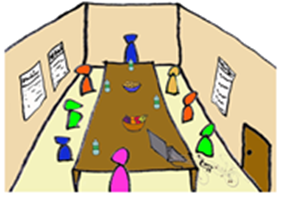 |
Person-centered approaches require that practitioners enter every situation respectfully with an understanding that each person’s culture is dynamic, can include multiple cultural identities, and can have a significant influence on every aspect of life. This necessitates the use of facilitation skills that honor the values, norms, morals, beliefs, practices, customs, ceremonies, rituals, and language of those with whom we plan.
Who is invited to a person-centered planning meeting and by whom?
We teach a process by which the student is supported in identifying and inviting those people they would like to have attend. This may include family members, friends, teachers (former or current), instructional assistants, CST members, administrators, and others.
What is the relationship between person-centered planning and the IEP?
The project supports schools in making the IEP process increasingly more person-centered. Each school determines how they will incorporate these approaches by collaborating with students and families.
Does this project help educators support students who may have dreams that many feel are not possible or realistic?
Yes. We teach a specific approach for supporting each person and their team in exploring and discovering what underlies a dream so that we can understand it and how it connects to what is most important to them. We can then help the person move toward those aspects of the dream that are both positive and possible. Listening, understanding, and supporting the student to research the dream and the path needed to get there is important. It may also be possible to help the student to recognize other areas of passion and giftedness that expand their possibilities for their vision of a positive future.
Is the student present for the person-centered planning meeting?
Yes, the student is present from start to finish with almost no exceptions. This includes students who do not use words to communicate. Facilitators are trained to create conditions to maximize the ability of each student to attend and participate in their meeting.
NEW! IEP Family Workbooks
- Early Elementary (English) (Spanish Version)
- Elementary (English) (Spanish Version)
- Middle School (English) (Spanish Version)
- High School (English) (Spanish Version)
- 18-21-Year-Olds (English) (Spanish Version)
PCAST Information Gathering Packet
Sample lessons from our lesson bank:
 Official Site of The State of New Jersey
Official Site of The State of New Jersey